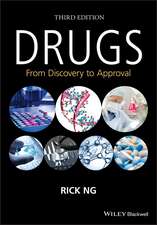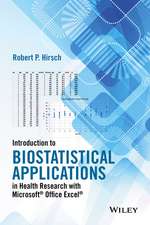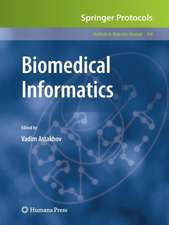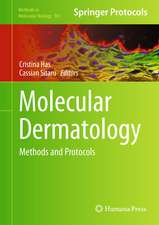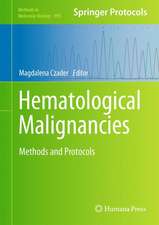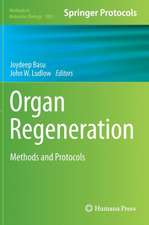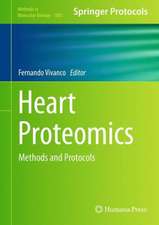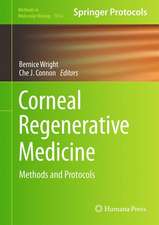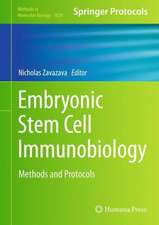Breast Cancer: Molecular Genetics, Pathogenesis, and Therapeutics: Contemporary Cancer Research
Editat de Anne M. Bowcocken Limba Engleză Hardback – 11 ian 1999
| Toate formatele și edițiile | Preț | Express |
|---|---|---|
| Paperback (1) | 1342.13 lei 39-44 zile | |
| Humana Press Inc. – 9 noi 2010 | 1342.13 lei 39-44 zile | |
| Hardback (1) | 1452.28 lei 6-8 săpt. | |
| Humana Press Inc. – 11 ian 1999 | 1452.28 lei 6-8 săpt. |
Preț: 1452.28 lei
Preț vechi: 1528.72 lei
-5% Nou
Puncte Express: 2178
Preț estimativ în valută:
277.89€ • 289.57$ • 230.09£
277.89€ • 289.57$ • 230.09£
Carte tipărită la comandă
Livrare economică 03-17 aprilie
Preluare comenzi: 021 569.72.76
Specificații
ISBN-13: 9780896035607
ISBN-10: 0896035603
Pagini: 582
Ilustrații: XV, 582 p. 18 illus., 2 illus. in color.
Dimensiuni: 178 x 254 x 34 mm
Greutate: 1.47 kg
Ediția:1999
Editura: Humana Press Inc.
Colecția Humana
Seria Contemporary Cancer Research
Locul publicării:Totowa, NJ, United States
ISBN-10: 0896035603
Pagini: 582
Ilustrații: XV, 582 p. 18 illus., 2 illus. in color.
Dimensiuni: 178 x 254 x 34 mm
Greutate: 1.47 kg
Ediția:1999
Editura: Humana Press Inc.
Colecția Humana
Seria Contemporary Cancer Research
Locul publicării:Totowa, NJ, United States
Public țintă
ResearchCuprins
I Etiology: Genetic Changes Associated with Breast Cancer.- 1 The Estrogen Receptor and Breast Cancer.- 2 Epidermal Growth Factor-Related Peptides and Their Cognate Receptors in Breast Cancer.- 3 The Role of Fibroblast Growth Factors in Breast Cancer Pathogenesis and Progression.- 4 Transforming Growth Factor-? and Breast Cancer.- 5 The Insulin-Like Growth Factor Network and Breast Cancer.- 6 Molecular Alterations in Breast Cancer.- 7 Apoptosis and the Development of Breast Cancer.- 8 WNT Genes and Breast Cancer.- 9 Hereditary Breast Cancer Genes.- 10 Biological Functions of the BRCA1 and BRCA2 Proteins.- 11 Psychosocial Issues in BRCA1/2 Testing.- II Biology of Tumor Progression: Breast Cancer Metastasis.- 12 Nm23, Breast Differentiation, and Cancer Metastasis.- 13 Role of Integrins in the Development and Malignancy of the Breast.- 14 Matrix Metalloproteinases in the Pathogenesis of Breast Cancer.- 15 The Urokinase Plasminogen Activation System in Breast Cancer.- 16 Angiogenesis in Breast Cancer: Role in Biology, Tumor Progression, and Prognosis.- III Therapeutics and Diagnostics: Diagnosis.- 17 Cytogenetic Approaches to Breast Cancer.- 18 Current and Future Directions in Surgical and Chemotherapeutic Approaches to Breast Cancer Treatment.- 19 Breast Cancer Therapy Using Monoclonal Antibodies Against Epidermal Growth Factor Receptor and HER-2.- 20 Towards the Therapeutic Targeting of Matrix Metalloproteinases in Breast Cancer.- 21 MUC1 Mucin as a Tumor Antigen in Breast Cancer.- 22 Aromatase Inhibitors and the Role of Hormonal Therapy in Breast Cancer.- 23 Drug Resistance in Breast Cancer.- 24 Smoking as a Risk Factor for Breast Cancer.- 25 The Estrogenicity of Selected Nutrients, Phytochemicals, Pesticides, and Pollutants: Their Potential Roles in Breast Cancer.
Recenzii
"Extensive information about a multitude of topics associated with breast cancer genetics and possible causative factors in breast cancer progression is provided. This book also includes both a generalized overview of breast cancer therapeutics as well as the most current thoughts on experimental treatment ideas. The chapter, "Hereditary Breast Cancer Genes," is extremely well covered...the chapter on psychological issues surrounding genetic testing is particularly strong because of its use of case examples. The discussion of surgical and chemotherapeutic approaches is thorough and cohesive...this is an excellent resource for researchers in the field...This book stands out in that it provides a comprehensive approach to the relevant advances in breast cancer research as they apply to therapeutics, an approach that has been missing in the recent literature." -Doody's Health Sciences Book Review Journal
". . .successfully steers between the impossibility of a comprehensive book on all aspects of breast cancer and the undesirability of a quasi-random selection of isolated topics. The chapters are clearly written, succinct, and eminently readable for the physician as well as the molecular biologist. The book is well referenced and summarizes a wealth of data in a straight-forward and digestible manner. . .For the research scientists, epidemiologists, and clinician, this book will serve as an interesting and useful guide to the coming era."-The New England Journal of Medicine
"The book has 25 chapters divided into 3 sections dealing with etiology and cancer genes, diagnosis, therapeutics and drug resistance, and environmental risk factors. Each chapter is densely packed with data. . .Lerman and Peshkin have written a very important chapter about the psychosocial aspects of genetic testing. Several case reports help make in the information relevant. . .The book will be extremely helpful to the graduate student and laboratory investigator who wantsto have a single source with good references."-Oncology
"It represents a state-of-the-art review of current and future research directions in breast cancer treatment,...The references are extensive...the translational provides relevant clinical correlations whenever possible. Another strength is that most chapters conclude with a summary of the salient points....provides important information for pathologists who are heavily involved with breast cancer."-Modern Pathology
"...an exhaustively encyclopedic text on the topic, focusing on the research of its development, causes and treatments. It is well written and concise, and extensively covers all issues that research scientists and medical consultants might encounter in the study of breast cancer." -The Journal of Family Practice
"...an excellent state-of-the-art summary of breast cancer research and treatment."-Anticancer Research
"...The editor has brought together an impressive collection of specialists to provide a broad range of subjects. The book is extensively referenced and individual chapters are thorough and detailed in the coverage of the topics. In this respect, the book meets its aims admirably....this is a good reference book and does have have something for clinicians as well as basic scientists, It will be a useful source of information for those involved in breast cancer research and treatment."- Human Genetics
". . .successfully steers between the impossibility of a comprehensive book on all aspects of breast cancer and the undesirability of a quasi-random selection of isolated topics. The chapters are clearly written, succinct, and eminently readable for the physician as well as the molecular biologist. The book is well referenced and summarizes a wealth of data in a straight-forward and digestible manner. . .For the research scientists, epidemiologists, and clinician, this book will serve as an interesting and useful guide to the coming era."-The New England Journal of Medicine
"The book has 25 chapters divided into 3 sections dealing with etiology and cancer genes, diagnosis, therapeutics and drug resistance, and environmental risk factors. Each chapter is densely packed with data. . .Lerman and Peshkin have written a very important chapter about the psychosocial aspects of genetic testing. Several case reports help make in the information relevant. . .The book will be extremely helpful to the graduate student and laboratory investigator who wantsto have a single source with good references."-Oncology
"It represents a state-of-the-art review of current and future research directions in breast cancer treatment,...The references are extensive...the translational provides relevant clinical correlations whenever possible. Another strength is that most chapters conclude with a summary of the salient points....provides important information for pathologists who are heavily involved with breast cancer."-Modern Pathology
"...an exhaustively encyclopedic text on the topic, focusing on the research of its development, causes and treatments. It is well written and concise, and extensively covers all issues that research scientists and medical consultants might encounter in the study of breast cancer." -The Journal of Family Practice
"...an excellent state-of-the-art summary of breast cancer research and treatment."-Anticancer Research
"...The editor has brought together an impressive collection of specialists to provide a broad range of subjects. The book is extensively referenced and individual chapters are thorough and detailed in the coverage of the topics. In this respect, the book meets its aims admirably....this is a good reference book and does have have something for clinicians as well as basic scientists, It will be a useful source of information for those involved in breast cancer research and treatment."- Human Genetics
Textul de pe ultima copertă
In Breast Cancer: Molecualr Genetics, Pathogenesis, and Therapeutics, Anne Bowcock has brought together many leading authorities to create today's leading state-of-the-art summary of breast cancer research and treatment. The book's many distinguished contributors illuminate the biology and genetics of breast cancer, including what is known about the hereditary breast cancer genes, BRCA1 and 2, the cutting-edge cytogenic approaches, and the biology of breast cancer metastasis. In addition, the authors describe current and future methods of breast cancer treatment in depth, and discuss environment and diet as risk factors for the disease.
Constituting an excellent reference and resource for all clinical and experimental oncologists as well as those genetic counselors and nurses who need to understand the latest developments in breast cancer biology, risk, and treatment, Breast Cancer: Molecualr Genetics, Pathogenesis, and Therapeutics will broaden their knowledge of the disease and permit them to focus on the critical questions that still need to be answered.
Constituting an excellent reference and resource for all clinical and experimental oncologists as well as those genetic counselors and nurses who need to understand the latest developments in breast cancer biology, risk, and treatment, Breast Cancer: Molecualr Genetics, Pathogenesis, and Therapeutics will broaden their knowledge of the disease and permit them to focus on the critical questions that still need to be answered.







